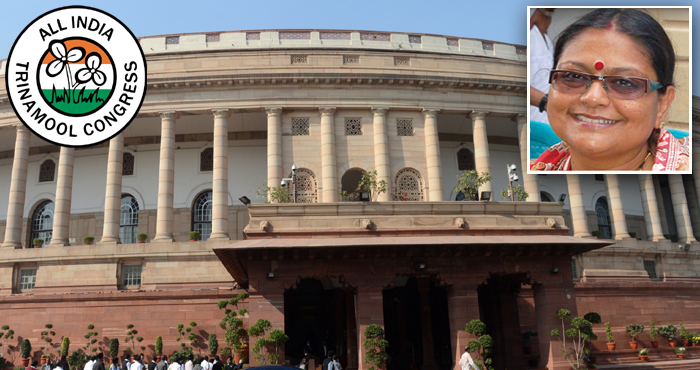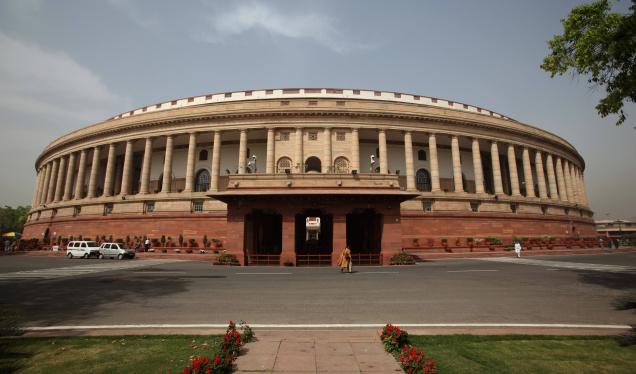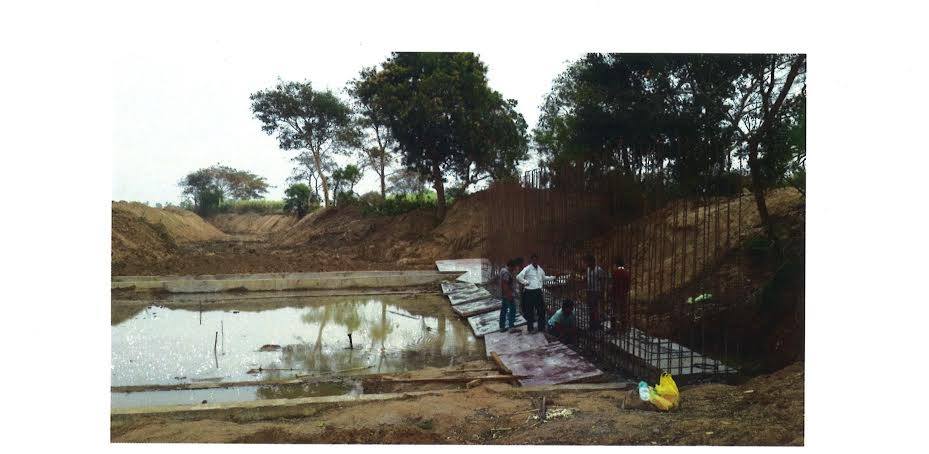Mananiya Sabhapati Ji, Main meri party Sarva Bharatiya Trinamool Congress ki oar se abhar vyakt karti hu ki aap ne mujhe mauka diya Rail Mantri ki pesh kiya hua jo Budget hain unn per charcha karne ke liye.
Mananiya Railway Minister Suresh Prabhu ji halhi mein Kolkata aaye they aur unhone mujhe behen bol ke pukara. Mere mann mein toh laddu futne lagi ki abhi Budget mein mujhe kuch milne wale hain. Lekin main hairan ho gayi ki Budget mein na mere kshetra Barasat aur Udayrajpur station ke liye kuch tha, na mere rajya ke liye kuch tha aur na sare uttar purba anchal, jo ‘seven sisters’ hain, pichre huye rajyo hain, ke liye kuch tha. Main abhi unko yeh bolna chahti hu ki yeh jo States hain North-East mein, pichra hua States hain, salo sal se yeh States vanchit hain aur aap jante ho ki inke mang koi nehi sunta.
Lekin Paschim Bangal ka sawal par main baad me aayungi. Yeh North-East mein jo States, hain jab hamare mukhyamantri mananiya Mamata Banerjee Rail Mantri thi, tab unhone inn rajyo ke liye bahut kuch sanction kar ke bahut kuch kohshish ki thi.
I will quote, “Madam, I propose to draw up a masterplan for the development of railway infrastructure in the North-East in consultation with the North-East Development Council and the State authorities concerned. In the North-East, 10 projects have been declared as national projects and adequate funds have been provided. The progress of some of the projects is getting affected by the adverse law and order situation. However, the Lumding-Silchar gauge conversion project has been given special priority for expeditious completion. The work on the Byrnihat- Shillong route has also been included in this Budget as a national project for providing rail connectivity to the capital of Meghalaya. And also the tea-growing region of Barak Valley between Durlavchera and Cheragi has been sanctioned this time.”
She had also mentioned in her Budget, and I quote, “Madam, the government is giving priority in providing rail connections with the neighbouring countries. Surveys for five new lines have been conducted for rail connectivity with Nepal. Out of these lines, it is proposed to take up new lines from Jogbani to Biratnagar,” etc.
So out of these that she had started, we really don’t find much allotment given to them now, and I would like to refer to a published document of the Ministry itself. Misaal ki khatir do char States ki naam leti hu.
Andhra Pradesh has a total track length of 7,033 km, West Bengal, of 10,466 km, Maharashtra, of 9,208 km. Compare this with the north-eastern states: Arunachal Pradesh has a total track length of 23 km only. Manipur, of 3 km, Meghalaya, of 13 km, Mizoram, of 5 km, Nagaland, of 24 km and Tripura, of 193 km. Isn’t it so sad? This in a country which is governed everywhere by the same rules and laws; and we have peoples’ representation here. The people of these States are being deprived. This is not my data, this is published data, and hardly any allotment has been given to these States.
And for the last seven years, I have been a member of this Standing Committee and through it, from the reports published and the discussions, we get to know that the Ministry of DoNER is sometimes given money from the Central government for the development of infrastructure which includes schools, hospitals, electrical substations, roads and railways. They are working through the Ministry of DoNER. And in spite of the thousands of crores (I don’t want to go through each because it will be a very lengthy process) being allotted through the Ministry of DoNER for the development of these north-eastern States, none of the work has progressed. I really tend to agree that the goodwill shown by the allotment of money or by the demand of the citizens is totally absorbed somewhere down the line. I don’t know whether it is by the bureaucracy or elsewhere. But no work is really taking place on the ground level, and the people are suffering.
So this has to be given a really serious thought when the Rail Budget is again discussed and I would request the Hon’ble Railway Minister to take into account the plight of the people of the north-eastern region.
Now about the state of affairs in West Bengal. When our Hon’ble Chief Minister Mamata Banerjee was the Railway Minister, she had proposed certain amounts of money for some factories in West Bengal. And we from the All India Trinamool Congress party had met the Hon’ble Railway Minister one year back, on 18th march 2015, with our requirements. We had pleaded with him to let us continue the projects started so that the people can benefit and eastern India as a whole can progress. Among those projects were the Kanchrapara railway coach factory, Kharagpur workshop, Noapara workshop, Dankuni railway equipment factory and the modernisation of Liluah. But I am so sorry to say that in this Budget only Rs 1000 has been given to these projects. It looks like some kind of joke to me. Rs 1000 se kya hoga? And why are we being neglected so much?
In last year’s Budget there were 31 pages and this is 46 pages, but I really don’t understand if there is really anything extra here or whether any thought or any homework or discussion has gone behind preparing this year’s 46 pages of Budget?
Maine abhi abhi suna ki Sansad mein logon ka suraha ka kaam hota, and there have been discussions to have committees, but I don’t think I have ever been called to any committee where our requests were bided. I think there is a some kind of a communication gap within the bureaucracy.
An underpass was sanctioned when my leader Smt Mamata Banerjee was the Railway Minister. Woh kaam ruka huya tha. Main abhari hoon ke Rail Mantra ji ne unko chalu karne ka irada liya.
The work started. The Engineering department, they were very kind to start the work. Before they could proceed any further on the first day the signal on the electrical department gave a stay order and the work is stop so I think there is some kind of communication gap at that bureaucratic level. So that whatever their decision is going from here that is also not being implemented. Now this budget we are looking at it really doesn’t look like a budget to me. Because there are only few pages in the end of it. Otherwise the rest of it there is no mention about the passenger earnings, about the fate earnings, about the gross traffic resifts and the budgetary supplements etc.
So we really feel that this kind of serious thought has to be given before we can proceed further with the works that pending from the time that Hon’ble Chief Minister of West Bengal presently who was then the Hon’ble Railway Minister. She was trying for the whole country and she had sanctioned many projects. Most of the projects are stopped. Now I don’t understand whether it is political vendetta or not but the fact of the matter is that it is not happening.
Now we had also requested the Hon’ble Minister that certain thinks be taken into account which have not being taken into account though this budget since like a shadow of vision 2020. Most of the things that my Chief Minister of West Bengal Hon’ble Mamata Banerjee she had published in the vision 2020 document.
And like what Bengal thinks today India thinks tomorrow. Most of the things of the visions 2020 document about the rest of the country has taken but except the project is in West Bengal. So it is a matter of great regret that we are being left out from the whole project like this and to quote a few, you know the double decor train was first Mamata Banerjee’s idea. She has started 9 such.
The increasing of speed of train was also started buy her and she has started the Duranta Express. But in an unprecedented move unfortunately the name of Duranta is also being changed. Which has never happened in India? Rajdhani has always remained Rajdhani. But why the name of Duranta has been changed if duffels me totally.
See there has also been regional cuisine introduced into trains by Mamata Banerjee. Dedicated freight corridor work has started during her period. The revenue earning through advertisement through airspace and land space of rail was also her idea she started putting advertisement on the walls of the local stations. The IT initiatives in ticketing were taken by her and she started computerized ticketing system. Organizational restructuring were done in 32 places. The improvement of passenger comfort she also started and I remember that she had started a lady’s waiting room along with a lady’s toilet in Barasat and when in this times Budget, we find toilet here, toilet there, toilet everywhere. It is not that I am opposing toilets, it is a good idea to keep the country clean but where on the one hand we are talking about toilets everywhere. There was one lady’s toilet in Barasat’s station in my constituency along with the lady’s waiting room, which has been taken by the officials and the lady has been thrown out and is being used as an office now. It simply baffles me why. The toilets started by Mamata Banerjee are being closed down .
In a local trends and local commuters are there but I don’t know why. The ninth point in the version 20:20 document had said about enlarging the freight basket. This is also there this time and the innovation and incubation. I think most of the points are from version 20:20 but what is significantly missing is the Izzat ticket. Jo garib hai, jo lachar hai, ussko izzat se saffar karne ke leya izzat ka ticket diya gaya tha. Bees kilometre woh pachees rupaya meh chalte tha aur ham jo sansad hai. Hamar paas aatha ham signature karke dethe the aur maheena bhar jata tha apna kam meh, school meh kehe nuakri mai, who izzat chenliya gaya hai. I seriously demand that the Izzat ticket be brought back and women particularly vendors and the working class be given this chance to travel at a very low cost. The next point that I would like to highlight here is the security of the train, the security of the passengers to maintain the security and running of trains smoothly. The MMUs have found no place in the Budget we don’t find any mention of them. Though the lot of gang men is being improved it’s a commendable step taken, but i would really like to question the that there are about 80 thousand junior engineers in the railway and all of them together ensure the safety of the trains running and they spending a lot of their youth and time towards their work to make the railways run smoothly 80 thousand of them. I would just like to draw the attention of Hon’ble Minister here that the India Gazette notification number 605 was circulated by DOPT on ninth April 2009 to improve the quality of service given by government employees. Certain department like CPWD, MES etc they have upgraded junior engineers but the Indian Railways which is the largest technical organisation having 80000 of them , they have not taken this particular Gazette notification and these junior engineers are now made to work like Group D staff. I don’t think that is satisfying for them so for the security, safety of smooth running of the trains. I think their requirements and the gazette notification should be given respect. As far as the security is concerned this is quite strange and I heard other Hon’ble members speaking about it also and Hon’ble Minister also regarding the security arrangements. The maintenance of law and order in railways and railway premises is the responsibility of the concerned state “State Police”. Whereas the security of passengers and their belongings in the running train is the responsibility of the railway protection force. Now by the RPF amendment 2003 the railway protection force is suppose to take place of this. But you know when some crime happens, the common man really does not know the jurisdiction. There was this incident in Bangalore, some one month back when a gentleman, when a young person he was run over by a truck. I think most of you have seen that item in newspaper. His lower torso was run over and he was lying still alive, the upper torso also lying somewhere, when people went to pick him up the first thing he said is that I want to donate my organs because he knew that he was going to die.
Similar thing happened in West Bengal two weeks back a lady was run over by a train. A lady was run over by a train. Her legs were lying on the other side of the line. The upper part was the other side of line and remembering that incident reading it in the media, this lady remember and she is started telling people pick me up. And I want to donate my eyes, my organs but we will not believe Sir, there is a tussle between the local GRP and the Railway protection force as to in whose jurisdiction the legs are and whose jurisdiction is the body is and who will pick her up.
So I sincerely feel these two forces must be amalgamated or some kind of decision come at by which the whole Railway safety security premises passengers, everything is taken care of by one single force. So the people are safe when they are travelling.
There are 7000 passenger trains. And in this only 3500 have guards. So we think that all passenger trains must be accompanied by guards and we should have the other point of securities unman level crossing.
The unman level crossing total number has been nearly 30000. It is 30348. When Mamata Banerjee became the railway minister she has started manning them.
So that statistics proves that in 2011 consequential death due to accidents at level crossing which were unman was 46% which is come down to 33% in 2015 just why manning few level crossing. So we demand they cannot be any unman level crossing.
People have to be engaged to man them otherwise they have to be locked an Aerobes made. The aerobes are serious essentialities which have to be looked at so that people can travel safely.
I also have been crying for level crossing at Itna Colony and my friend Satabdi Roy (famous film star) she also want a level crossing of Makwa, we have been asking for five years now but really nothing else happen.
So I would like to draw the attention of the Hon’ble Minister also to a very serious inclusion in the budget this year. The Hon’ble Minister called the cabinet decision as a landmark by which 400 stations would be redevelop through PPP.
Now going through the Budget I find station development – PPP, Cleaning of stations– PPP, Facility Management – PPP, Logistic part – PPP, Where hose – PPP. I see a large cloud looming of privatization. I don’t know whether I am true or wrong. But so many PPPs for running towards railway is not healthy for the nation that is my feeling.
Now the railway employees 14 lakhs of people are working, the gagman have been taken care, thank you very much but what about the other 14 lakhs who are working. Hon’ble Railway Minister, the then Railway Minister Mamata Banerjee had provided for the parents to travel for them to take for treatment from the employees, families, children to get better education facilities but none of it is here I find. So I think this should be given a thought.
And the last two points I would like to point out that about the pilgrim circuit is concern, West Bengal has many places of pilgrimage. We have Kalighat, Trakeswar temple, Tarapith Temple. We have Furfura Sarif. All have been left out. We want these to be connected in the pilgrim service.
And about the tourist circuits nobody can think of tourism in India without Dooars because that is the place where Flora and Fauna is in the hills of Himalayas. So let it be connected Sir.
Through this I would like to congratulate regarding the lowering of the Carbon Footprint that Hon’ble Minister is thinking for putting solar panels alongside the railway tracks but I would suggest that we have solar panels on a top all running trains so that local current camp be provided within the trains but these also Hon’ble the then railway Minister Mamata Banerjee had supplied CFL and ensured that CFL be only used so this was also started.
So I think that the vision 2020 of Mamata Banerjee has been followed to certain extent. But I don’t agree completely with the other things and I would draw your attention to it.



